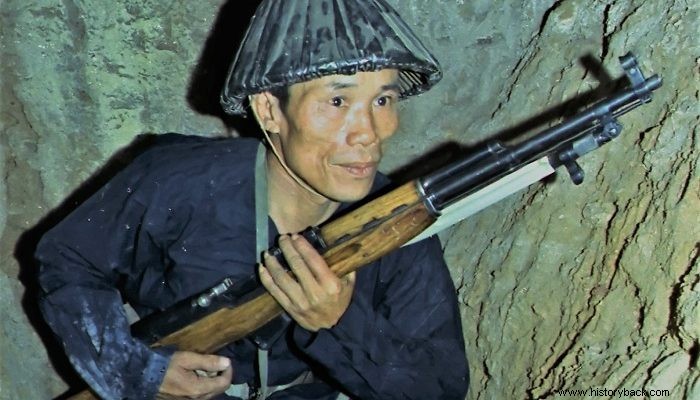
Guerrilla warfare is not an invention of our time. Terrible examples of it exist from ancient times... to the present day. In Greece, in recent times, during the approximately 400 years of Turkish rule, a continuous guerilla war was fought in the mountains.
In 1808 the Spanish began a fierce guerrilla war against Napoleon the Great. In 1809 the Austrians of Tyrol imitated them and in 1812 the Russians. More recently, in World War II, liberation, rebel movements developed in almost all Axis-occupied countries.
In Vietnam, the very terrain forced the inhabitants to resort to such tactics, whether they were fighting the Chinese imperial armies, the Japanese, or the French colonialists. Unorthodox warfare became second nature to Vietnamese fighters.
Fate also used him against the Americans, since the latter could not, for political reasons, use conventional tactics and invade North Vietnam, and here it must be clarified that the Americans were defeated in the Vietnam War, precisely because they did not invade the North Vietnam and did not dismantle it, as a state entity, as they undoubtedly had the power to do.
But they did not, fearing the reaction of the Soviets and the Chinese. Escalating the war would be dangerous. After the expulsion of the French, the Viet Cong rebels began, from 1957, actions on the territory of South Vietnam. Their first action was to execute as many actual or potential opponents as they found in each village they invaded.
The president and teacher of each village were their first victims. Next came the landowners and every anti-communist, or even neutral. Only when this objective was achieved, did the purely military attacks begin.
But already with the extermination of the "reactionary nomeklatura" in the villages, it was very easy for them to display their propaganda in the villages, undisturbed, winning the illiterate, in the overwhelming majority of the villagers, to their side.
Immediately after that, military operations began to strain the opponent and demoralize him. With ambushes, minelaying and road traps, with bombing attacks on camps and bases, they gave the impression that they were everywhere.
On the contrary, the South Vietnamese soldiers did not feel safe anywhere. In Vietnam there was never a front, in the formal sense of the term, behind which there was a safe friendly zone. Unfortunately, the morale of the tragically trained, and even more tragically staffed and led South Vietnamese Army collapsed completely.
If the Americans had not come, the war would have ended by 1965 at the latest. Superpower intervention gave a ten-year life extension to the moribund state formation called South Vietnam. And after the intervention of the Americans, however, the Viet Cong continued to apply the same successful recipe and indeed with greater ingenuity, in order to face the high level of training and equipment of the American Army.
It is worth noting that the Americans were not defeated in any battle in the Vietnam War. However, they lost the war! And yes, the Americans had the most modern, for the time, weapons and equipment, and yes, their troops were well trained, but they simply could not defeat an invisible enemy, who knew perfectly well the difficult terrain of his homeland and had the moral forces to withstand the wear and tear that the superior firepower of the Americans would cause him.
The hardened Viet Cong, for their part, considered, not unjustly, the Americans to be good fighters, but "luxury" fighters. They themselves had learned to operate under absolute enemy air superiority, to counter the barrage of American weapons, to survive like troglodytes in sunless tunnels inside the ground, literally like moles.
They knew that they could not afford to radio the artillery or the air force to change a location in a matter of minutes. So they resorted to other methods. The soil of their homeland, the reeds, the rocks, the animals, became their accomplices. Hundreds of American soldiers were killed or wounded by the most primitive weapons – spears, arrows – or by the silent traps of the pointed bamboos, or the pits of the poisonous snakes.
The American soldiers, who in the majority of them, served only for one year in Vietnam, so even if they wanted to, they did not have time to adapt to this form of war. It is worth noting that the "old men" of a platoon took care to avoid acquaintances and contacts with new soldiers, knowing that either the young men will be killed on the first mission, or that due to their inexperience they will "take on their neck" an old colleague .
In these conditions only infantry and ground forces in general can prevail. But ground forces with experience and very high morale. "Police" type American liquidation operations were not enough. It was not enough to clear and gain ground, which could not be maintained.
